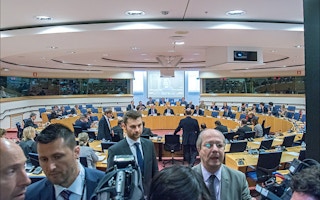The decision by British voters to leave the European Union is a wake-up call for the authors of the New Urban Agenda being prepared for the Habitat III conference that will take place in Quito in October.
The immediate impact in global financial markets of this decision demonstrates that global events can have major impacts for nations and cities. This includes the drop in value of the British pound, the steep decline in global market prices, and the uncertainty as to whether this event will provoke a global crisis as in 2008 after the collapse of the Lehman Brothers bank in the United States.
The revised draft of the New Urban Agenda released on 18 June largely ignores the possible impacts of external events — other than climate change — on the economic, social and political conditions in cities. Its 17 pages and dozens of commitments for cities to contribute to what the United Nations has defined as sustainable development exist in a “timeless” framework, as if what happens in London, New York, São Paulo, Manila or Mexico City does not depend in part on global and national economies.
Two dimensions of this problem are immediately affected by the ‘Brexit’ vote of 23 June. The first is global economic performance and its implications at both the national and city levels. The second is the social implications for the treatment of migrants, refugees and the urban poor.
“
The British exit from the European Union could well now have similar effects. Certainly this includes a drop in global liquidity at a time when credit for new investment in infrastructure is seen as an important measure to support sustainable development, as well as to protect cities from the effects of climate change.
Economic implications
At this point, it is important to look back a few years to the lessons learned during the 2008-11 global economic crisis. At that time, what began as a housing-finance crisis in the United States became an international credit crisis that immediately affected global trade and the demand for goods and services from developing countries.
In turn, this credit crisis became a trade crisis that resulted in national economic crises across the globe, as countries found that they were no longer able to sell their products in international markets. National and local economic crises then sparked national and local public-finance crises as national and public revenues dropped. In many places, this led to layoffs of public employees and dramatically reduced public services including education, health, police and fire protection.
The British exit from the European Union could well now have similar effects. Certainly this includes a drop in global liquidity at a time when credit for new investment in infrastructure is seen as an important measure to support sustainable development, as well as to protect cities from the effects of climate change.
Social consequences
The campaign for Britain’s leaving the European Union was fuelled in part by the reaction of a significant share of the British electorate to increasing flows of migrants into the United Kingdom. The referendum’s results now send a strong anti-migrant message to the world at large, particularly to peoples fleeing war, disaster and unpromising economic conditions in their own countries.
In contrast, the revised New Urban Agenda reads as if reducing poverty and inequality and assuring opportunity for all could be assured simply by writing it in a United Nations declaration.
Yet Brexit makes it even more imperative that the social and political support for building diverse and welcoming societies is perceived as a major, immediate priority — not just for migrants traversing the Greek islands into Europe but also for the urban social contract implied by the New Urban Agenda.
Together, the economic and social implications of the Brexit vote must be used to significantly strengthen the New Urban Agenda to be approved at Habitat III. The document must have strong philosophical and political foundations, and assert that the world “we need” can only be achieved by being aware of the global context in which we live as well as the political imperatives implied by international commitments.
Michael Cohen is a professor of international affairs at the New School in New York.
This story was published with permission from Citiscope.org, a nonprofit news outlet that covers innovations in cities around the world. More at Citiscope.org.











